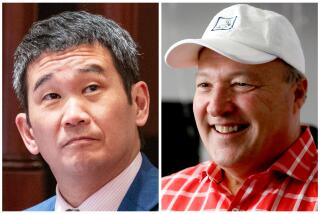Election Violations Cost Baugh $47,900
- Share via
Assembly Republican leader Scott Baugh agreed Tuesday to pay a civil fine of $47,900 for nine violations of the state Political Reform Act, ending a political misconduct case that began with Baugh’s election in 1995.
The fine, imposed by the Fair Political Practices Commission, concludes a long-standing controversy in which Baugh (R-Huntington Beach) once faced felony and misdemeanor charges stemming from a special election in which Republicans were accused of scheming to split the Democratic vote. State Atty. Gen. Bill Lockyer sought the dismissal of perjury and campaign finance reporting charges in March and the case became a civil matter.
“The resolution of these campaign reporting errors through the FPPC is the solution I have sought for nearly four years,” Baugh said. “I’m happy to have this matter resolved and laid to rest.”
Baugh, who was named leader of the minority GOP delegation in April, agreed to make $2,500 monthly payments through February 2001 on behalf of himself, his campaign committee and former campaign treasurer Daniel A. Traxler. Baugh can use campaign funds to pay the fine. The settlement was approved by a Superior Court judge Tuesday.
Mark Soble, the commission’s senior counsel for enforcement, said the agency was able to secure a larger fine from Baugh by pursuing the case as a civil, rather than administrative, matter. Lockyer, a Democrat, referred the matter to the commission after then-Dist. Atty. Mike Capizzi was removed from the case by an Orange County judge.
“The commission viewed the violations as very serious, and the settlement reflects that assessment,” Soble said.
The fine was among the 40 largest imposed since the commission was formed in 1974. The largest fine--$833,000--was levied against a political committee in 1993.
Baugh still faces a financial disclosure violation relating to his 1998 reelection. Next month, the commission is scheduled to consider an unrelated $2,000 administrative settlement with the assemblyman for failing to disclose $30,000 in contributions from Philip Morris in October 1998, agency spokeswoman Sigrid Bathan said.
In the settlement approved Tuesday, Baugh and Traxler agreed that they violated state campaign laws by illegally accepting an $8,800 cash contribution from a Huntington Beach merchant and failed to properly report a $1,000 contribution from the spouse of an eventual Democratic opponent. The pair then returned the $1,000 contribution in cash, another violation. State law forbids cash transactions of $100 or more.
Other accusations involved the misreporting of loans from Baugh’s girlfriend, whom he later married, and loans from both of their families, which were reported as personal loans.
Baugh said he and his contributors spent $350,000 in legal bills over the past four years fighting criminal charges that were eventually dismissed. While Baugh continues to deny any intentional wrongdoing, he said it was time to be done with the controversy.
“I have other things to do and it would have cost me more in legal fees to fight it rather than settle this and put it behind me,” Baugh said.
In a 1995 special election, Baugh succeeded former Assembly Speaker Doris Allen (R-Cypress), who was recalled by voters after she joined forces with Assembly Democrats and was named speaker of the Legislature’s lower house.
Baugh was accused of helping high-ranking Republicans place a decoy Democratic candidate on the ballot as a way of splitting Democrats’ share of the winner-take-all vote, a legal tactic critics called unethical. The candidate, Laurie Campbell, was removed from the ballot before the election by a Sacramento judge for falsifying candidacy paperwork.
During a series of Orange County court hearings, Baugh denied encouraging Campbell to run though he admitted that the campaign made reporting mistakes. In a statement filed with the court, Traxler took responsibility for the reporting errors.
Most of the original charges against Baugh were dismissed after an Orange County judge ruled that Capizzi’s office engaged in prosecutorial misconduct by failing to present exculpatory evidence to the grand jury. Capizzi refiled new charges, but the case was turned over to Lockyer after another Orange County judge ruled in 1998 that Capizzi’s office had engaged in “grave misconduct.” Capizzi ran for state attorney general in 1998 and lost to Lockyer.
Four campaign aides--including Rhonda Carmony, the former campaign manager and now wife of Rep. Dana Rohrabacher (R-Huntington Beach)--eventually pleaded guilty to misdemeanors for other election law violations related to helping Campbell qualify as a candidate. They received probationary sentences and fines.
More to Read
Get the L.A. Times Politics newsletter
Deeply reported insights into legislation, politics and policy from Sacramento, Washington and beyond. In your inbox three times per week.
You may occasionally receive promotional content from the Los Angeles Times.









